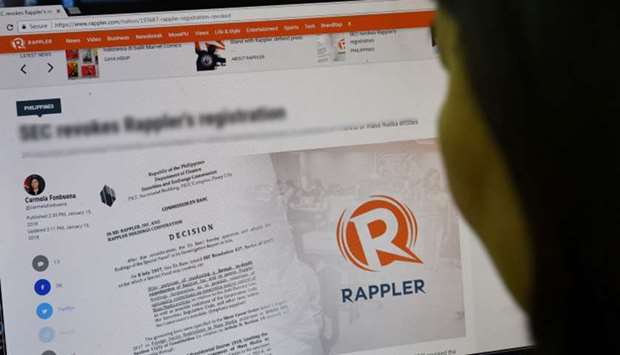The Philippines' tax bureau filed a criminal complaint on Thursday accusing news site Rappler and two executives of evading 133.8 million pesos ($2.6 million) in tax, the latest move against a network whose reporting has irritated the government.
The case comes eight weeks after the Securities and Exchange Commission rescinded Rappler's operating licence for violating foreign ownership rules.
Rappler continues to operate pending an appeal and says it has done nothing wrong and is being punished on multiple levels for scrutinising the government. It says the complaint is another case of ‘harassment’, having already received seven complaints from state agencies in recent weeks.
The Bureau of Internal Revenue said Rappler had profited from the sale of Philippine Depositary Receipts (PDR) to foreigners in 2015 and should pay income and value added tax.
An American investor in Rappler who had bought PDRs has agreed to donate its interests to Rappler's managers, which it said would give the government no legal grounds to stifle its operations.
The alleged tax liability comprised of 91.3 million pesos in income tax and 42.5 million pesos in VAT. Also subject of the complaint was Rappler chief Maria Ressa and its treasurer, James Bitanga.
Rappler said BIR agents went to its office this week with a letter from its tax evasion unit that was ‘scant with details’. Normal procedure provides respondents with 30 days to reply, it said.
‘This is clear intimidation and harassment. The government is wasting its energy and resources in an attempt to silence reporting that do not please the administration,’ Ressa said.
Urging the BIR to check its own records, she said Rappler had been paying its taxes accurately, promptly and diligently.
President Rodrigo Duterte's spokesman, Harry Roque, asked to comment on the case, said: ‘If there really is unpaid tax, they should be held accountable.’
The government has repeatedly denied it is going after Rappler or trying to stifle freedom of the press.
Rappler has challenged Duterte frequently, questioning the accuracy of his public statements and scrutinising his war on drugs and his foreign policy moves.
It has done a series of stories about ties between Duterte's office and bloggers who have influenced online hate campaigns against his opponents and journalists.

